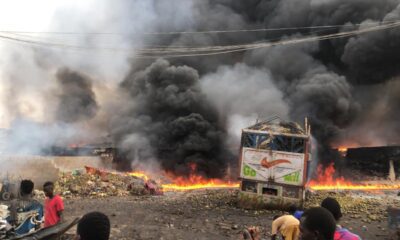Top Story
Bauchi: Police apprehend final-year law student for alleged online harassment, character defamation

Adeyanju Esther
In a significant development that underscores the growing concerns over online defamation and harassment, The Bauchi State Police Command has apprehended a 34-year-old final-year Law student of Ahmadu Bello University (ABU) Zaria, Usman Adamu, for alleged involvement in defaming a Divisional Police Officer (DPO) in the state, CSP Danladi Mohammed, on Facebook.
According to a statement released by the spokesman of the Bauchi State Police Command, SP Ahmed Mohammed Wakil, Adamu stands accused of making derogatory statements against CSP Danladi Mohammed on his Facebook page, thereby tarnishing the officer’s reputation and character.
The arrest came after Adamu confessed to the online publication during police interrogation, admitting that he had based his statements on hearsay without a thorough investigation of the situation. The statement from SP Wakil highlighted the sequence of events leading to Adamu’s arrest.
It was revealed that the incident prompting Adamu’s defamatory remarks occurred on April 2, when one AbdulmumuniLiman, also known as Kwakiya, allegedly assaulted and inflicted injuries on another individual over a land dispute. The police received a complaint about the incident, prompting an investigation into the matter.
The situation escalated when a mob gathered in solidarity with the complainant, leading to a physical confrontation between the two sides. However, the timely intervention of a police team, led by DPO CSP Danladi Mohammed, helped resolve the conflict and prevent further escalation.
Despite the resolution of the situation, Adamu’s defamatory remarks on Facebook sparked concerns about potential misinformation and its implications for community peace and security. Consequently, Adamu was arrested and transferred to the State Criminal Investigation Department (SCID) for further investigation, in accordance with directives from the Commissioner of Police.
In a public apology posted on his Facebook page on April 8, Adamu expressed remorse for his actions, acknowledging his mistake and seeking forgiveness from the authorities and specifically from CSP Danladi Mohammed. He emphasized the fallibility of human nature and urged individuals to disregard his previous statements.
The arrest of Adamu serves as a cautionary tale regarding the consequences of online harassment and defamation, highlighting the need for responsible use of social media platforms and adherence to ethical standards in communication. As the investigation progresses, authorities remain vigilant in upholding justice and ensuring the protection of individuals’ reputations from unwarranted attacks.
Top Story
Divestments: Companies urge NUPRC to grant Ministerial consent without conditions


…As Commision offers options to fast track sale transactions
Oil companies involved in bids to close the sale of divested assets by International oil companies in the country have called on the Nigerian Upstream Regulatory Commission (NUPRC) to grant Ministerial consent without conditions.
The companies were reacting during a forum ‘Dialogue with CCE on divestment,’ organised by the NUPRC.
Speaking at the forum the Chairman, Shell Companies in Nigeria, Osagie Okunbor commended NUPRC for the process put in place to hasten the conclusion of the transactions.
He, however, said while the company would study the options presented by the government, he would prefer that the Minister’s consent was received without conditions attached.
Shell Petroleum Development Company alongside Chappal Energies is seeking to acquire the onshore oil and gas assets operated by Equinor ASA.
The Equinor divestment to Chappal includes a stake in the prolific Agbami oil field. The biggest deal in the divestment process is the bid by Renaissance to acquire the onshore assets of Shell worth about $2.4 billion.
Oando is seeking to acquire NAOC assets from Eni for the control of OMLs 60, 61, 62 and 63 in a deal worth about $1.3 billion while Seplat is bidding to take over Mobil assets in a deal worth over $1.28 billion.
Addressing the stakeholders, the NUPRC Commission Chief Executive, Engr. Gbenga Komolafe said the commission was determined to close out the deals as the government continues its effort to ramp up oil production.
The options, he explained, include: “A. Grant of Ministerial consent to the divestments, on the condition that entities will retain liabilities until the Commission’s Investigation is concluded and the liabilities are allocated to the proper party.
“The divesting companies will be required to issue an undertaking to retain the liabilities until confirmation of the release by the Commission of all or part of the retained liabilities.
“B. Ministerial consent will not be granted until the Commission has Identified and assigned all liabilities to the capable party.
“The divesting entities will be required to Issue a waiver, waiving their rights to deemed consent as provided in Section 95 (7) (b) of the Petroleum Industry Act, PIA.”
Engr. Komolafe noted that the first option would ensure that Ministerial consent is received before the end of June while the second option would see the deals concluded in August.
Speaking on the transactions, he said, “A total of 26 blocks are proposed to be divested. These blocks have an estimated total reserve of 8.211million barrels of oil, 2,699 million barrels of condensate, 44,110 billion cubic feet of associated gas and 46,604 billion cubic feet of non-associated gas.
“This is a significant contribution to the nation’s hydrocarbon resources. Additionally, these blocks contain P3 reserves estimated at 5,557 million barrels of oil, 1,221 million barrels of condensate, 14,296 billion cubic feet of associated gas and 13,518 billion cubic feet of Non-Associated Gas.
“It is worth noting that a substantial part of the P3 reserves is located in or near producing assets. This means that a competent successor could easily mature them to 2P reserves. Additionally, the current average production from these blocks is 346,290 barrels per day (bpod) (NAOC-28,018 bopd, MPNU-159,378 bopd, EQUINOR-36,155 bopd and SPDC-122,739 bopd), but the technical production potential is much higher – standing at 643,054 barrels (NAOC-147,481 bopd, MPNU-244,268 bopd, EQUINOR-39,203 and SPDC-212,102 bopd).
“These blocks have the potential to significantly boost our national production, which would benefit all stakeholders,” he added.
He insisted that the Commission’s “regulatory goal is to ensure that parties in the divestment process conform to the approved divestment guidelines. We aim to ensure that the companies that take over these blocks have the necessary financial resources and possess the technical expertise required to responsibly manage the blocks throughout their lifecycle in accordance with good asset stewardship practices.”
“Furthermore, we must ensure that the inherent environmental, host communities and end-of-life liabilities, i.e. decommissioning liabilities, are accurately identified and assigned to the party best equipped to bear the associated risks. This necessitates a comprehensive understanding of regulatory requirements, industry best practices, and the unique challenges associated with oil and gas operations,” he explained.
Top Story
NDIC increases deposit insurance coverage for financial institutions


…New review ensures safety of depositors’ funds — MD
…Warn depositors against patronising unregistered operators
By Matthew Denis, Abuja
The Nigeria Deposit Insurance Commission (NDIC) has announced an increase in maximum deposit insurance coverage for financial institutions in the country.
The new review was announced at a press briefing held at the NDIC headquarters in Abuja.
The Managing Director of the NDIC, Mr. Bello Hassan revealed that the increase of the maximum deposit insurance coverage from N500,000 to N5,000,000, would provide full coverage of 98.98percent of the total depositors compared with the current cover of 89.20 percent.
The MD said, “Findings indicate that high percentages of depositors ranging from 89.20 percent to 99.99 percent were fully insured under the maximum deposit insurance coverage levels across different bank categories (DMBs, PMBs, MFBs, and PSBs), meanwhile, a substantial portion of the total value of deposits, remain uninsured.
“We need to stress at this juncture that high levels of uninsured deposits pose a risk of bank runs. Indeed, the International Association of Deposit Insurers (IADI) Brief No. 9 of 2023 that examined the recent bank failures in the United States of America and Switzerland, concluded that, high levels of uninsured deposits in insured institutions might increase the likelihood of bank runs with dire impact on the stability of the financial system,” he explained.
Mr. Bello stressed “that based on these considerations, and in line with our commitment to enhancing depositors’ protection, public confidence, financial inclusion, and stability of the financial system, I am pleased to announce that the NDIC’s Interim Management Committee (IMC), during its 18th meeting held on April 24th and 25th, approved an 3 increase in the maximum deposit insurance coverage levels for all licensed deposit-taking financial institutions with immediate effect.
“The adjustments are as follows: i. Deposit Money Banks (DMBs) The increase of the maximum deposit insurance coverage from N500,000 to N5,000,000, would provide full coverage of 98.98 percent of the total depositors compared with the current cover of 89.20 percent.
“In terms of the value of deposit covered, the revised coverage would increase the value of deposits covered by deposit insurance to 25.37 percent compared with the current cover of 6.31 percent of total value of deposits.”
The NDIC boss explained that at the Microfinance Banks (MFBs) the increase of the maximum deposit insurance coverage from N200,000 to N2,000,000, would provide full coverage of 99.27 percent of the total depositors compared with the current level of 98.76 percent and would increase the value of deposits covered by deposit insurance to 34.43 percent compared with 14.38 percent of total value of deposit, currently covered.
He revealed that Primary Mortgage Banks (PMBs) The increase of the maximum deposit insurance coverage from N500,000 to N2,000,000 would provide full coverage of 99.34 percent of the total depositors compared with the current 97.98 percent and would increase the value of deposits covered by deposit insurance to 21.04 percent compared with 10.77 percent of total value of deposit, currently covered.
”While the Payment Service Banks (PSBs) the increase of the maximum deposit insurance coverage from N500,000 to N2,000,000 would provide full coverage of 99.98 percent of the total number of depositors and would increase the value of deposits covered by deposit insurance to 43.10percent of the total value deposits from the current cover of 40.60 percent.”
“Subscribers of Mobile Money Operators: The increase of the maximum Pass-through deposit insurance coverage from N500,000 to N5,000,000 per subscriber per MMO as the applicable coverage level for depositors of DMBs. 4 7.0 I must emphasise that, the revised deposit insurance coverage has balanced the NDIC’s goals of deposit protection and financial system stability with incentives for depositors to practice market discipline and prevent banks from unnecessary risk-taking and moral hazard. Consideration was given to ensure that the coverage was limited but adequate enough to protect a large number of depositors and credible enough to prevent the destabilizing effect of bank runs,” he said.
Speaking further, Bello said the adoption of the revised maximum deposit insurance coverage is supported by the Corporation’s current funding, represented by the balances in the various Deposit Insurance Funds (DIFs), expected annual premium collection, enhanced supervision that would reduce the likelihood of bank failures, effective bank resolution frameworks and other funding arrangements provided by the NDIC Act No. 33 of 2023.
He buttressed further by noting, “I would like to reaffirm the NDIC’s unwavering commitment to protecting depositors and contributing to the stability of the financial system. These adjustments to the maximum deposit insurance coverage reflect our dedication to adapt and evolve in response to the changing landscape of the financial industry, and we remain steadfast in our pursuit of a secure and resilient banking environment for all.”
The MD also advised depositors to patronise only licensed and registered financial operators by the Central Bank and NDIC to avoid falling prey to mouth-watering Fintech operators who deceive customers with a lot of incentives and high interest rates.
Top Story
Minimum wage: Governors await committee decision, assure workers of increased wages


The 36 states Governors of Nigerian states have stated that they are awaiting the decision of the 37-member tripartite committee inaugurated on the National Minimum Wage before taking an action on minimium wage.
Recall that the Federal Government had earlier set up a committee to look into the demands of the Organised Labour regarding measures to cushion the effects of the removal of fuel subsidy.
Edo State has since go on to increase her minimium wage to N70,000 while other Governors have initiated wage awards for workers in their respective states.
In a statement signed yesterday by the Nigeria Governors Forum (NGF) Chairman and Governor of Kwara State, AbdulRahman AbdulRazaq, at the end of the virtual meeting held Wednesday night, the state executives disclosed that they were committed to looking into issues bordering on the remuneration of state judicial officers and the infrastructure of the courts.
The 36 state governors under the aegis of the NGF said that they celebrate with workers across the country for their dedication to service and patience, as all have worked with the Federal Government, labour, the organised private sector, and relevant stakeholders in arriving at an implementable national minimum wage.
According to the governors, while they acknowledge various initiatives adopted recently by way of wage awards and partial wage adjustments, it was imperative to state that the 37-member tripartite committee inaugurated on the National Minimum Wage was still in consultation and yet to conclude its work, just as they said that they would remain committed to the process and promise that better wages would be the invariable outcome of their ongoing negotiations.
The statement read, “We, members of the Nigeria Governors’ Forum (NGF), at our meeting held today, deliberated on various issues of national importance.
“The Forum celebrates with workers across the country their dedication to service and patience as we work with the Federal Government, labour, organised private sector, and relevant stakeholders to arrive at an implementable national minimum wage.
“While we acknowledge various initiatives adopted recently by way of wage awards and partial wage adjustments, it is imperative to state that the 37-member tripartite committee inaugurated on the National Minimum Wage is still in consultation and yet to conclude its work.
“As members of the committee, we are reviewing our individual fiscal space as state governments and the consequential impact of various recommendations to arrive at an improved minimum wage we can pay sustainably. We remain committed to the process and promise that better wages will be the invariable outcome of ongoing negotiations.
“Members received the outgoing Country Director, Mr. Shubham Chadhuri, and the incoming Country Director, Mr. Ndiame Diop, of the World Bank, to discuss the Bank’s vision for transitioning. Mr. Chadhuri appreciated the Forum for the strategic role it continues to play in coordinating collective action for developmental change.
“He applauded the non-partisan character of the Forum, the professionalism of its Secretariat, and state governments’ commitment to mutual accountability mechanisms such as performance-based financing interventions by the Bank. Members expressed confidence in the choice of Mr. Diop to lead the collaboration going forward and look forward to a sustained and deepened relationship.
“The Forum discussed the revised National Policy on Justice (2024–2028) from the just concluded National Summit on Justice on 24th & 25th April 2024. Members agreed to consider the submissions from the summit as may concern their individual states, including recommended legal amendments, administrative improvements, and policies to strengthen the justice sector. Also, the Forum committed to looking into issues bordering on remuneration of state judicial officers and the infrastructure of the courts.”
“The Forum received a presentation from the National Human Capital Development (HCD) Programme—Core Working Group Secretariat, led by Ms. Rukaiya El-Rufai and Dr. Ahmad Abdulwahab. Both highlighted the marginal progress made by states and its contribution to Nigeria’s Human Development Index (HDI), especially across health, nutrition, education, and labour force participation.
“Having reviewed the previous program design and national strategy, a revised governance and implementation roadmap was proposed to scale up impact and ensure sustainability. Members pledged to support the effective domestication of proposed revisions to the national HCD strategy.
“Members received a briefing from Mrs. Oyinda Adedokun, Program Manager, State Action on Business Enabling Reforms (SABER) Federal Ministry of Finance Programme Coordination Unit.
“The briefing highlighted states’ performance in implementing advocated reforms relating to land administration; regulatory framework for private investment in fiber optic infrastructure, services provided by investment promotion agencies and public-private partnership units; efficiency and transparency of government-to-business services, under the World Bank financed program.
“The Forum commiserated with the Governors of Rivers State, H.E. Siminalayi Fubara, and Ogun State, H.E. Prince Dapo Abiodun, over the petrol tanker explosion and gas explosion that occurred on April 26th and 27th, 2024, respectively. Members called for proper maintenance of trucks, especially those fitted to convey Compressed Natural Gas (CNG), and recommended appropriate training for truck drivers.
“On enforcement of regulations, members resolved to engage relevant Ministries, Departments, & Agencies (MDAs) in order to align the activities of federal regulators with the operations of officials at the sub-national level.”
-
capital market2 years ago
Rt.briscoe, FBNH, Others halts negative performance of stock market
-
Finance3 months ago
Court orders Sen. Victor Umeh to repay N136m bank debt to AMCON
-



 Abuja Update2 months ago
Abuja Update2 months agoUNDP, FG partnership needed to achieve inclusion, equity- Minister
-
Abuja Update1 month ago
Banks drive stock market performance with N147bn gain
-



 Business2 weeks ago
Business2 weeks agoTingo Group unveils Tingo Electric, Tingo Cola drink at Lagos launch
-



 Health2 weeks ago
Health2 weeks agoCapacity training will reduce migration of health workers- NPHCDA
-
News4 months ago
Oil thieves sponsoring malicious media campaign against Navy – Spokesman
-



 Infotech1 month ago
Infotech1 month agoWorld Backup Day: NITDA urges Nigerians to ensure backup of data












